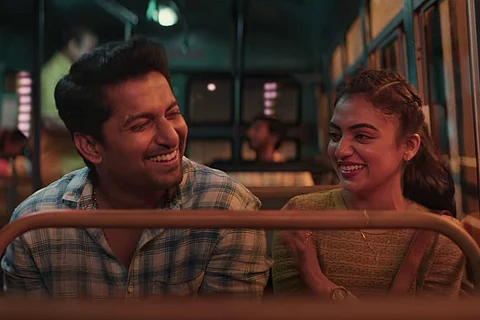

Vivek Athreya's Ante Sundaraniki is a Telugu romcom that attempts to bring together two contrasting worlds. A Hindu Brahmin man and a Christian woman. The film opens with the two of them in their respective homes, both preparing to leave for the US. The intercuts establish how different they are from each other. Chalk and cheese. The opening sequence sets up the expectation that the two of them will meet in the foreign country, be repulsed by each other's differences initially, eventually reconcile and fall in love. That's the obvious plot that writes itself. But to Vivek's credit, that isn't what unfolds.
Nani as Sundar and Nazriya as Leela Thomas are charming actors who can sell ice to an Eskimo, and the film relies heavily on their likeability to engage the viewer. The scenes that work the best are the ones where our protagonists are grappling with the tedious traditions and religious ideas that their families impose on them. Though Nani isn’t very convincing as someone who’s in his 20s, it’s still entertaining to watch Sundar go through the numerous homams and pujas that his family subjects him to; Nazriya plays Leela with her characteristic perkiness but changes colour when required.
Naresh and Rohini as Sundar’s parents, and Azhagam Perumal and Nadhiya as Leela’s parents, get meaty roles, and the seasoned actors don’t disappoint. Rohini, especially, shines. Tanvi Ram as Leela’s sister, Pushpa, also gets a few important scenes and a powerful line on women and the compulsion of motherhood. Aruna Bhiskhu plays Sundar’s grandmother with aplomb, and the child actors who play the young Sundar (some great dancing there) and Leela are convincing too. Yes, the cast of Ante Sundaraniki is terrific. But at the end of the nearly three-hour film, you really wonder what the point was.
Sundar and Leela are schoolmates. They’re children when they meet but even as adults, they still behave like children. The plot twists itself into unnecessary convoluted stretches that become repetitive and test your patience. Take, for instance, Sundar’s numerous conversations with his colleague Sowmya (Anupama Parameswaran) and his boss (an excellent Harsha Vardhan) where he’s recounting the series of events in his life. It’s amusing at first but when he does it over and over again, you find yourself wishing for a fast forward button. The lively background score cannot sustain our enthusiasm forever. Then there’s the ‘possibilities’ trick where we’re presented with different ways in which a situation could play out. Again, a good idea, but stretched for so long that you wish for a deus ex machina resolution to the crisis (an earthquake that kills all the characters instantly, for example).
A good screenplay is one where the writer knows when to keep things straightforward and when to insert an unpredictable twist. But Ante Sundaraniki is like a magic show where the writer-director is constantly forcing in a ‘Voila!’ moment. It becomes tiresome after a point. What was that bizarre Joseph character doing in the film?
You know that proverb about conducting a wedding even if a thousand lies have to be said? Leela and Sundar may be from different religions but they both treat this sentiment as sacred. Except, the lies they come up with are so farfetched…and unnecessary. Even a turkey would have told Leela and Sundar that they’re doing something extremely stupid that will only complicate their lives, but for some reason, they embark on their grand plan with conviction.
Ante Sundaraniki gets several things right. It tries to make a case for humanity over religion. It tries to overturn stereotypes about motherhood. It tries to question casteist practices. It tries to do all this with a light touch and with actors who deliver solid performances. But it’s not really as “progressive” as the director will have you believe. Sundar and Leela’s strange attitude towards premarital sex, for example. The director wants us to believe that these two people, in the year 2020 (that’s when the film is set), fight tooth and nail to be together, overturning centuries of prejudice and bigotry, but they are on the same page as their conservative parents when it comes to physical contact before marriage. They may make up totally wild stories about their relationship but they’re actually from the Victorian era after all (Leela is only allowed to rest her head on Sundar’s shoulder, that’s it). Why, why why?
The film would have benefitted from some (okay, a lot of) sharp trimming. As it stands, Ante Sundaraniki is overlong, and the good ideas within it are diluted by the distractions. Nani, Nazriya and the supporting cast almost succeed in making you sit through though. Just about.
Disclaimer: This review was not paid for or commissioned by anyone associated with the film. Neither TNM nor any of its reviewers have any sort of business relationship with the film's producers or any other members of its cast and crew.